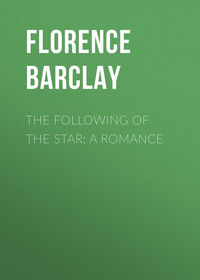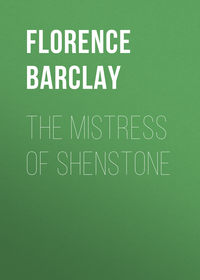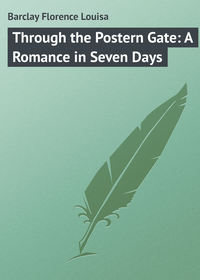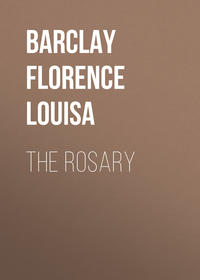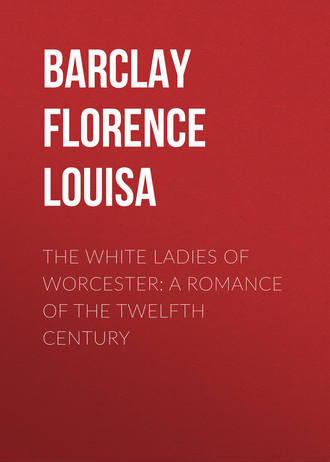 полная версия
полная версияThe White Ladies of Worcester: A Romance of the Twelfth Century
Would her poor heart in time also grow calm? Would her lips stop trembling, and cease to feel the fire of his?
Yet for one moment, only, her mind dwelt upon herself. Then all thought of self was merged in the realisation of his loneliness, his suffering, his bitter disillusion. To have found her dead, would have been hard; to have lost her living, was almost past bearing. Would it cost him his faith in God, in truth, in purity, in honour?
The Prioress felt the insistent need of prayer. But passing the gracious image of the Virgin and Child, she cast herself down at the foot of the crucifix.
She had seen a strong man in agony, nailed, by the cruel iron of circumstance, to the cross-beams of sacrifice and surrender. To the suffering Saviour she turned, instinctively, for help and consolation.
Thus speedily had her prayer of the previous night been granted. The piercèd feet of our dear Lord, crucified, had become more to her than the baby feet of the Infant Jesus, on His Mother's knee.
Yet, even as she knelt—supplicating, interceding, adoring—there echoed in her memory the wicked shriek of Mary Seraphine: "A dead God cannot help me! I want life, not death!" followed almost instantly by Hugh's stern question: "Is this religion?"
Truly, of late, wild voices had taken liberty of speech in the cell of the Prioress, and had left their impious utterances echoing behind them.
CHAPTER XVII
THE DIMNESS OF MARY ANTONY
The Prioress had been back in her cell for nearly an hour, when a gentle tap came on the door.
"Enter," commanded the Prioress, and Mary Antony appeared, bearing broth and bread, fruit and a cup of wine.
The Prioress sat at her table, parchment and an open missal before her.
Her face was very white; also there were dark shadows beneath her eyes.
She did not smile at sight of old Antony, thus laden.
"How now, Antony?" she said, almost sternly. "I did not bid thee to bring me food."
"Reverend Mother," said the old lay-sister, in a voice which strove to be steady, yet quavered; "for long hours you have studied, not heeding that the evening meal was over. Chide not old Antony for bringing you some of that broth, which you like the best. You will not sleep unless you eat."
The Prioress looked at her uncomprehendingly; as if, for the moment, words conveyed no meaning to her mind. Then she saw those old hands trembling, and a sudden flood of colour flushed the pallor of her face.
This sweet stirring of fresh life within her own heart gave her to see, in the old woman's untiring devotion, a human element hitherto unperceived. It brought a rush of comfort, in her sadness.
She closed the volume, and pushed aside the parchment. "How kind of thee, dear Antony, to take so much thought for me. Place the bowls on the table. . . . Now draw up that stool, and stay near me while I sup. I am weary this night, and shall like thy company."
Had the golden gates of heaven opened before her, and Saint Peter himself invited her to enter, Sister Mary Antony would not have been more astonished and certainly could hardly have been more gratified. It was a thing undreamed of, that she should be bidden to sit with the Reverend Mother in her cell.
Drawing the carven stool two feet from the wall, Mary Antony took her seat upon it.
"Nearer, Antony, nearer," said the Prioress. "Place the stool here, close beside the corner of my table. I have much to say to thee, and would wish to speak low."
Truly Sister Antony found herself in the seventh heaven!
Yet, quietly observing, the Prioress could not fail to note the drawn weariness on the old face, the yellow pallor of the wizen skin, which usually wore the bright tint of a russet apple.
The Prioress took a portion of the broth; then pushed the bowl from her, and turned to the fruit.
"There, Antony," she said. "The broth is excellent; but I have enough.
Finish it thyself. It will pleasure me to see thee enjoy it."
Faint and thankful, old Antony seized the bowl. And as she drank the broth, her shrewd eyes twinkled. For had not the Devil said she would sup on it herself; knowing that much, yet not knowing that she would receive it from the hand of the Reverend Mother?
It has been ever so, from Eden onwards, when the Devil tries his hand at prophecy.
For a while the Prioress talked lightly, of flowers and birds; of the garden and the orchard; of the gift of three fine salmon, sent to them by the good monks of the Priory at Worcester.
But, presently, when the broth was finished and a faint colour tinted the old cheeks, she passed on to the storm and the sunset, the rolling thunder and the torrents of rain. Then of a sudden she said:
"By the way, Antony, hast thou made mention, to any, of thy fearsome tale of the walking through the cloisters, in line with the White Ladies, of the Spectre of the saintly Sister Agatha?"
"Nay, Reverend Mother," said Mary Antony. "Did not you forbid me to speak of it?"
"True," said the Prioress. "Well, Antony, I went in the storm, to look for her; but—I found not Sister Agatha."
"That I already knew," said Mary Antony, nodding her head sagaciously.
The Prioress cast upon her a quick, anxious look.
"What mean you, Antony?"
Then old Mary Antony fell upon her knees, and kissed the hem of the Prioress's robe. "Oh, Reverend Mother," she stammered, "I have a confession to make!"
"Make it," said the Prioress, with white lips.
"Reverend Mother, when you sent me from you, after making my report, I went first, as commanded, to the kitchens. But afterward, in my cell, I found these."
Mary Antony opened her wallet and drew out the linen bag in which she kept her peas. Shaking its contents into the palm of her hand, she held out six peas to view.
"Reverend Mother," she said, "there were twenty-five in the bag. I thought I had counted twenty out into my hand; so when all the peas had dropped and yet another holy Lady passed, I thought that made twenty-one. But when I found six peas in my bag, I became aware of my folly. I had but counted nineteen, and had no pea to let fall for the twentieth holy Lady. Yet I ran in haste with my false report, when, had I but thought to look in my wallet, all would have been made clear. Will the Reverend Mother forgive old Mary Antony?"
She shot a quick glance at the Prioress; and, at sight of the immense relief on that loved face, felt ready for any punishment with which it might please Heaven to visit her deceit.
"Dear Antony," began the Reverend Mother, smiling.
"Dear Antony—" she said, and laughed aloud.
Then she placed her hand beneath the old woman's arm, and gently raised her. "Mistakes arise so easily," she said. "With the best of intentions, we all sometimes make mistakes. There is nothing to forgive, my Antony."
"I am old, and dim, and stupid," said the lay-sister, humbly; "but I have begged of our sweet Lady to sharpen the old wits of Mary Antony."
After which statement, made in a voice of humble penitence, Mary Antony, unseen by the thankful Prioress, did give a knowing wink with the eye next to the Madonna. Our blessèd Lady smiled. The sweet Babe looked merry. The Prioress rose, a great light of relief illumining her weary face.
"Let us to bed, dear Antony; then, with the dawn of a new day we shall all arise with hearts refreshed and wits more keen. So now—God rest thee."
Left alone, the Prioress knelt long in prayer before the shrine of the Madonna. Once, she reached out her right hand to the empty space where Hugh had knelt, striving to feel remembrance of his strong clasp.
At length she sought her couch. But sleep refused to come, and presently she crept back in the white moonlight, and kneeling pressed her lips to the stone on which Hugh had kneeled; then fled, in shame that our Lady should see such weakness; and dared not glance toward the shadowy form of the dead Christ, crucified. For with the coming of Love to seek her, Life had come; and where Life enters, Death is put to flight; even as before the triumphant march of the rising sun, darkness and shadows flee away.
Yet, even then, our Lady gently smiled, and the Babe on her knees looked merry.
CHAPTER XVIII
IN THE CATHEDRAL CRYPT
On the day following, in the afternoon, shortly before the hour of Vespers, a stretcher was carried through the streets of Worcester, by four men-at-arms wearing the livery of Sir Hugh d'Argent.
Beside it walked the Knight, with bent head, his eyes upon the ground.
The body of the man upon the stretcher was covered by a fine linen sheet, over which lay a blue cloak, richly embroidered with silver. His head was swathed in a bandage of many folds, partially concealing the face.
The little procession passed through the Precincts; then entered the Cathedral by the great door leading into the nave.
Here a monk stood, taking careful note of all who passed in or out of the building. As the stretcher approached, he stepped forward with hand upraised.
There was a pause in the measured tramp of the bearers' feet.
The Knight lifted his eyes, and seeing the monk barring the way, he drew forth a parchment and tendered it.
"I have the leave of the Lord Bishop, good father," he said, "to carry this man upon the stretcher daily into the crypt, and there to let him lie before the shrine of Saint Oswald, during the hour of Vespers; from which daily pilgrimage and prayer, we hope a great recovery and restoration."
At sight of the Lord Bishop's signature and seal, the monk made deep obeisance, and hastened to call the Sacristan, bidding him attend the Knight on his passage to the crypt and give him every facility in placing the sick man there where he might most conveniently lie before the holy altar of the blessèd Saint Oswald.
So presently, the stretcher being safely deposited, the men-at-arms stood each against a pillar, and the Knight folded back the coverings, in order that the man who lay beneath, might have sight of the altar and the shrine.
As the Knight stood gazing through the vista of many columns, he found the old Sacristan standing at his elbow.
"Most worshipful Knight," said the old man, with deference, "our Lord Bishop's mandate supersedes all rules. Were it not so, it would be my duty to clear the crypt before Vespers. See you that stairway yonder, beneath the arch? Not many minutes hence, up those steps will pass the holy nuns from the Convent of the White Ladies at Whytstone—noble ladies all, and of great repute for saintliness. Daily they come to Vespers by a secret way; entering the crypt, they pass across to a winding stair in the wall, and so arrive at a gallery above the choir, from which they can, unseen, hear the chanting of the monks. I must to my duties above. Will you undertake, Sir Knight, that your men go not nigh where the White Ladies pass, nor in any way molest them?"
"None shall stir hand or foot, as they pass, nor in any way molest them," said the Knight.
Hugh d'Argent was kneeling before the altar, his folded hands resting upon the cross on the hilt of his sword, when the faint sound of a key turning in a distant lock, caught his ear.
Then up the steps and across the crypt passed, in silent procession, the White Ladies of Worcester.
There was something ghostly and awe-inspiring about those veiled figures, moving noiselessly among the pillars in the dimly-lighted crypt; then vanishing, one by one, up the winding stairway in the wall.
The Knight did not stir. He stayed upon his knees, his hands clasped upon his sword-hilt; but he followed each silent figure with his eyes.
The last had barely disappeared from view when, from above, came the solemn chanting of monks and choristers.
This harmony, descending from above, seemed to uplift the soul all the more readily, because the sacred words and noble sounds reached the listener, unhampered by association with the personalities, either youthful or ponderous, of the singers. All that was of the earth remained unseen; while that which was so near akin to heaven, entered the listening ear.
Kneeling in lowly reverence with bowed head, the Knight found himself wondering whether the ascending sounds reached that distant gallery in the clerestory where the White Ladies knelt, as greatly softened, sweetened, and enriched, as they now came stealing down into the crypt. Were the hearts of those veiled worshippers also lifted heavenward; or—being already above the music—did the ascending voices rather tend to draw them down to earth?
Upon which the Knight fell to meditating as to whether that which is higher always uplifts; whereas that which is lower tends to debase. Certainly the upward look betokens hope and joy; while the downward casting of the eye, is sign of sorrow and despondency.
"Levavi oculos meos in montes"—chanted the monks, in the choir above.
He certainly looked high when he lifted the eyes of his insistent desire to the Prioress of the White Ladies. So high did he lift them, and so unattainable was she, that most men would say he might as well ask the silvery moon, sailing across the firmament, to come down and be his bride!
He had held her high, in her maiden loveliness and purity. But now that he had found her, a noble woman, matured, ripened by sorrow rather than hardened, yet firm in her determination to die to the world, to deny self, crucify the flesh, and resist the Devil—he felt indeed that she walked among the stars.
Yet he could not bring himself to regard her as unattainable. It had ever been his firm belief that a man could win any woman upon whom he wholly set his heart—always supposing that no other man had already won her. And this woman had been his own betrothed, when treachery intervened and sundered them. Yet that did not now count for much.
He had left a girl; he had come back to find a woman. That woman had infinitely more to give; but it would be infinitely more difficult to persuade her to give it.
At the close of their interview in her cell, the day before, all hope had left him. But later, as they paced together in the darkness, hope had revived.
The strange isolation in which they then found themselves—between locked doors a mile apart, earth above, earth beneath, earth all around them, they two alone, entombed yet vividly conscious of glowing life—had brought her nearer to him; and when at last the moment of parting arrived and again he faced it as final, there had come—all unheralded—the sudden wonder of her surrender.
True, she had afterwards withdrawn herself; true, she had sent him from her; true, he had gone, without a word. But that was because no promise could have been so binding, as that silent embrace.
He had gone from her on the impulse of the sweetness of obeying instantly her slightest wish; buoyed up by the certainty that no Convent walls could long divide lips which had met and clung with such a passion of mutual need.
That evening when, after much adventure, he at length gained the streets of the city, he had trodden them with the mien of a victor.
That night he had slept as he had not slept since the hour when his whole life had been embittered by a lying letter and a traitorous tongue.
But morning, alas, had brought its doubts; noon, its dark uncertainties; and as the hour of Vespers drew near, he had realised, with the helpless misery of despair, that it was madness to expect the Prioress of the White Ladies to break her vows, leave her Nunnery, and fly with him to Warwick.
Yet he carried out his plan, and kept to his undertaking, though here, in the calm atmosphere of the crypt, holy chanting descending from above, the remembrance still with him of the aloofness of those stately white figures gliding between the pillars in the distance, he faced the madness of his hopes, and the mournful prospect of a life of loneliness.
Presently he arose, crossed the crypt, and took up his position behind a pillar to the right of the exit from the winding stair.
The chanting ceased. Vespers were over.
He heard the sound of soft footsteps drawing nearer.
The White Ladies were coming.
They came.
The Knight was not kept long in suspense. The Prioress walked first. Her face was hidden, but her height and carriage revealed her to her lover. She looked neither to right nor left but, turning away from the pillar behind which the Knight stood concealed, crossed to the steps leading down to the subterranean way, and so passed swiftly out of sight.
The Knight stood motionless until all had appeared, and had vanished once more from view.
One, tall but ungainly, crooked of body, and doubtless short of vision, missed her way among the columns and passed perilously near to the Knight. With his long arm, he could have clasped her. How old Antony would have chuckled, could she but have known! "Sister Mary Rebecca embraced by the Knight of the Bloody Vest? Nay then; the Saints forbid!"
The stretcher, borne by four men-at-arms, passed out from the Cathedral.
The Knight walked beside it, with bent head, and eyes upon the ground.
As it passed through the Precincts, the Lord Bishop himself rode out on his white palfrey, on his way to the Nunnery at Whytstone.
The Knight, being downhearted, did not lift his eyes.
The Bishop looked, kindly, upon the stretcher and upon the Knight's dark face.
The Bishop had known Hugh d'Argent as a boy.
He grieved to see him thus in sorrow.
Yet the Bishop smiled as he rode on.
Perhaps he did not put much faith in the efficacy of relics, for so heavily bandaged a broken head as that upon the stretcher.
For there was a whimsical tenderness about the Bishop's smile.
CHAPTER XIX
THE BISHOP PUTS ON HIS BIRETTA
Symon, Lord Bishop of Worcester, having received a letter from the Prioress of the White Ladies, praying him for an interview at his leisure, sent back at once a most courtly and gracious answer, that he would that same day give himself the pleasure of visiting the Reverend Mother, at the Nunnery, an hour after Vespers.
The great gates were thrown open, and the Bishop rode his palfrey into the courtyard.
The Prioress herself met him at the door and, kneeling, kissed his ring; then led him through the lower hall, where the nuns knelt to receive his blessing, and up the wide staircase, to the privacy of her own cell.
There she presently unfolded to him the history of her difficulties with that wayward little nun, Sister Mary Seraphine.
"But the point which I chiefly desire to lay before you, Reverend Father," concluded the Prioress, "is this: If the neighing of a palfrey calls more loudly to her than the voice of God; if her mind is still set upon the things of the world; if she professed without a true vocation, merely because she wished to be the central figure of a great ceremony, yet was all the while expecting a man to intervene and carry her off; if all this bespeaks her true state of heart, then to my mind there comes the question: Is she doing good, either to herself or to others, by belonging to our Order? Would she not be better away?
"My lord, I fear I greatly shock you by naming such a possibility. But truly I am pursued by the remembrance of that young thing, beating the floor with her hands, and singing a mournful dirge about the crimson trappings of her palfrey. And, alas! when I reasoned with her and exhorted, she broke out, as I have told you, Reverend Father, into grievous blasphemy—for which she was severely dealt with by Mother Sub-Prioress, and has since been outwardly amenable to rules and discipline.
"But, though she may outwardly conform, how about her inward state? Well I know that our vows are lifelong vows; all who belong to our Order are wedded to Heaven; we are thankful to know that the calm of the Cloister shall be exchanged only for the greater peace of Paradise. But, supposing a young heart has mistaken its vocation; supposing the voice of an earthly lover calls when it is too late; would it seem right or possible to you, Reverend Father, to grant any sort of absolution from the vows; tacitly to allow the opening of the cage door, that the little foolish bird might, if it wished, escape into the liberty for which it chafes and sighs?"
The Bishop sat in the Spanish chair, drawn up near the oriel window, so that he could either gaze at the glories of the distant sunset, or, by slightly turning his head, look on the beautiful but grave face of the Prioress, seated before him.
While she was speaking he watched her keenly, with those bright searching eyes, so much more youthful than aught else about him. But now that he must make reply, he looked away to the sunset.
The light shone on the plain gold cross at his breast, and on the violet silk of his cassock. His face, against the background of the black Spanish wood, looked strangely white and thin; strong in contour, with a virile strength; in expression, sensitive as a woman's. He had removed his biretta, and placed it upon the table. His silvery hair rolled back from his forehead in silky waves. His was the look of the saint and the scholar, almost of the mystic—save for the tender humour in those keen blue eyes, gleaming like beacon lights from beneath the level eyebrows; eyes which had won the confidence of many a man who else had not dared unfold his very human story, to one of such saintly aspect as Symon, Bishop of Worcester. They were turned toward the sunset, as he made answer to the Prioress.
"The little foolish bird," said the Bishop—and he spoke in that gently musing tone, which conveys to the mind of the hearer a sense of infinite leisure in which to weigh and consider the subject in hand—"The little foolish bird might soon wish herself back in the safety of the cage. On such as she, the cruel hawks of life do love to prey. Absorbed in the contemplation of her own charms, she sees not, until too late, the dangers which surround her. Such little foolish birds, my daughter, are best in the safe shelter of the cloister. Moreover, of what value are they in the world? None. If Popinjays wed them, they do but hatch out broods of foolish little Popinjays. If true men, caught by mere surface beauty, wed them, it can mean naught save heartbreak and sorrow, and deterioration of the race. Women of finer mould"—for an instant the Bishop's eyes strayed from the sunset—"are needed, to be the mothers of the men who, in the years to come, are to make England great. Nay, rather than let one escape, I would shut up all the little foolish birds in a Nunnery, with our excellent Sub-Prioress to administer necessary discipline."
With his elbows resting upon the arms of the chair, the Bishop put his fingers together, so that the tips met most precisely; then bent his lips to them, and looked at the Prioress.
She, troubled and sick at heart, lifting deep pools of silent misery, met the merry twinkle in the Bishop's eyes, and sat astonished. What was it like? Why it was like the song of a robin, perched on a frosty bough, on Christmas morning! It was so young and gay; so jocund, and so hopeful.
Meeting it, the Prioress realised fully, what she had many times half-divined, that the revered and reverend Prelate sitting opposite, for all his robes and dignity, his panoply of Church and State, had the heart of a merry schoolboy out on a holiday.
For the moment she felt much older than the Bishop, infinitely sadder; more travel-worn and worldly-wise.
Then she looked at the silver hair; the firm mouth, with a shrewd curve at either corner; the thoughtful brow.
And then she looked at the Bishop's ring.
The Bishop wore a remarkable ring; not a signet, but a large gem of great value, beautifully cut in many facets, and clear set in massive gold. This precious stone, said to be a chrysoprasus, had been given to the Bishop by a Russian prince, in acknowledgment of a great service rendered him when he came on pilgrimage to Rome. The rarity of these gems arose partly from the fact that the sovereigns of Russia had decreed that they should be held exclusively for royal ornament, forbidding their use or purchase by people of lesser degree.
But its beauty and its rarity were not the only qualities of the precious stone in the Bishop's ring. The strangest thing about it was that its colour varied, according to the Bishop's mood and surroundings.
When the Prioress looked up and met the gay twinkle, the stone in the Bishop's ring was a heavenly blue, the colour of forget-me-nots beside a meadow brook, or the clear azure of the sky above a rosy sunset. But presently he passed his hand over his eyes, as if to shut out some bright vision, and to turn his mind to more sober thought; and, at that moment, the stone in his ring gleamed a pale opal, threaded with flashes of green.


